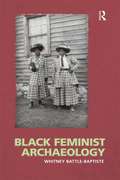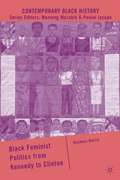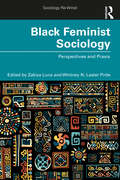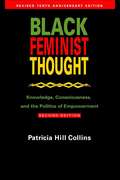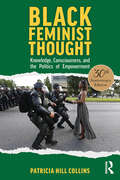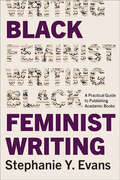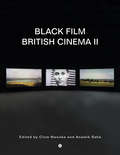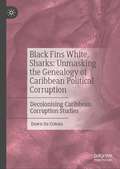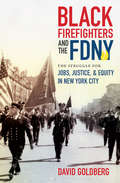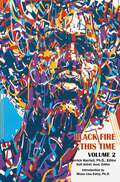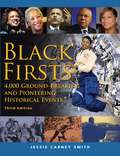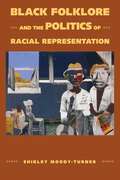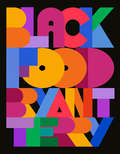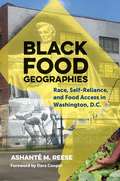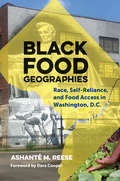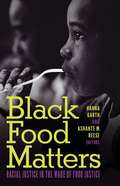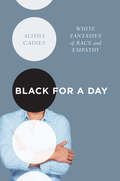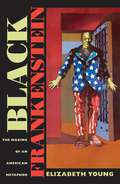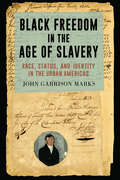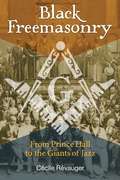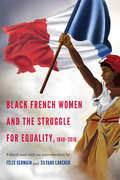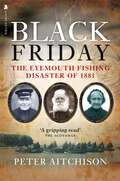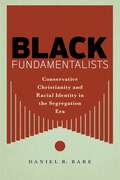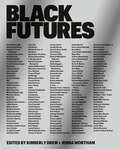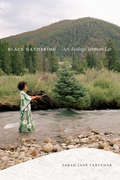- Table View
- List View
Black Feminist Archaeology
by Whitney Battle-BaptisteBlack feminist thought has developed in various parts of the academy for over three decades, but has made only minor inroads into archaeological theory and practice. Whitney Battle-Baptiste outlines the basic tenets of Black feminist thought and research for archaeologists and shows how it can be used to improve contemporary historical archaeology. She demonstrates this using Andrew Jackson‘s Hermitage, the W. E. B. Du Bois Homesite in Massachusetts, and the Lucy Foster house in Andover, which represented the first archaeological excavation of an African American home. Her call for an archaeology more sensitive to questions of race and gender is an important development for the field.
Black Feminist Politics from Kennedy to Clinton
by Duchess HarrisTaking an interdisciplinary approach, this book analyzes Black women's involvement in American political life, focusing on what they did to gain political power between 1961 and 2001, and why, in many cases, they did not succeed.
Black Feminist Sociology: Perspectives and Praxis (Sociology Re-Wired)
by Zakiya Luna Whitney PirtleBlack Feminist Sociology offers new writings by established and emerging scholars working in a Black feminist tradition. The book centers Black feminist sociology (BFS) within the sociology canon and widens is to feature Black feminist sociologists both outside the US and the academy. Inspired by a BFS lens, the essays are critical, personal, political and oriented toward social justice. Key themes include the origins of BFS, expositions of BFS orientations to research that extend disciplinary norms, and contradictions of the pleasures and costs of such an approach both academically and personally. Authors explore their own sociological legacy of intellectual development to raise critical questions of intellectual thought and self-reflexivity. The book highlights the dynamism of BFS so future generations of scholars can expand upon and beyond the book’s key themes.
Black Feminist Thought: Knowledge, Consciousness, and the Politics of Empowerment (Perspectives on Gender #Vol. 2)
by Patricia Hill CollinsIn spite of the double burden of racial and gender discrimination, African-American women have developed a rich intellectual tradition that is not widely known. In Black Feminist Thought, Patricia Hill Collins explores the words and ideas of Black feminist intellectuals as well as those African-American women outside academe. She provides an interpretive framework for the work of such prominent Black feminist thinkers as Angela Davis, bell hooks, Alice Walker, and Audre Lorde. The result is a superbly crafted book that provides the first synthetic overview of Black feminist thought.
Black Feminist Thought, 30th Anniversary Edition: Knowledge, Consciousness, and the Politics of Empowerment
by Patricia Hill CollinsIn the first major update to this classic book in many years, Collins traces the history and contours of Black women’s ideas and actions to argue that Black feminist thought is the discourse that fosters Black women’s survival, persistence, and success against the odds. Through meticulous research that synthesizes the important intellectual work done by Black women, Collins’s timely update demonstrates that Black women’s ideas and actions are not marginal concerns but rather are central to the future of social justice within democratic societies. The combination of the text’s classic arguments and a preface and epilogue written expressly for this edition speak to people who have long been working on social justice and to a new generation of readers who are encountering the ideas and actions of Black women for the first time. For this 30th year anniversary edition, Patricia Hill Collins examines how the ideas in this classic text speak to contemporary social issues and identifies the directions needed for the future of Black feminist thought.
Black Feminist Writing: A Practical Guide to Publishing Academic Books
by Stephanie Y. EvansWriting scholarly books is stressful, and academic publishing can be intimidating—especially for women, queer folks, and scholars of color. Black Feminist Writing shows scholars how to prioritize their mental health while completing a book in race and gender studies. Drawing on Black women's writing traditions, as well as her own experience as the author and editor of nine university press books, Stephanie Y. Evans gives scholars tools to sustain the important work of academic writing, particularly in fields routinely under attack by anti-democratic forces. Evans identifies five major areas of stress: personal, professional, publishing-related, public, and political. Each chapter includes targeted discussion questions and tasks to help authors identify their unique stressors, create priorities, get organized, and breathe. Whether working on your first scholarly book or your tenth, this robust, heartfelt guide will help you approach writing as an ongoing practice of learning, creating, and teaching in ways that center wellness and collective self-care.
Black Film British Cinema II
by Clive Nwonka and Anamik SahaThe politics of race in British screen culture over the last 30 years vis-a-vis the institutional, textual, cultural and political shifts that have occurred during this period.Black Film British Cinema II considers the politics of blackness in contemporary British cinema and visual practice. This second iteration of Black Film British Cinema, marking over 30 years since the ground-breaking ICA Documents 7 publication in 1988, continues this investigation by offering a crucial contemporary consideration of the textual, institutional, cultural and political shifts that have occurred from this period. It focuses on the practices, values and networks of collaborations that have shaped the development of black film culture and representation. But what is black British film? How do such films, however defined, produce meaning through visual culture, and what are the political, social and aesthetic motivations and effects? How are the new forms of black British film facilitating new modes of representation, authorship and exhibition? Explored in the context of film aesthetics, curatorship, exhibition and arts practice, and the politics of diversity policy, Black Film British Cinema II provides the platform for new scholars, thinkers and practitioners to coalesce on these central questions. It is explicitly interdisciplinary, operating at the intersections of film studies, media and communications, sociology, politics and cultural studies. Through a diverse range of perspectives and theoretical interventions that offer a combination of traditional chapters, long-form essays, shorter think pieces, and critical dialogues, Black Film British Cinema II is a comprehensive, sustained, wide ranging collection that offers new framework for understanding contemporary black film practices and the cultural and creative dimensions that shape the making of blackness and race.ContributorsBidisha, Ashley Clark, Shelley Cobb, James Harvey, Melanie Hoyes, Maryam Jameela, Kara Keeling, Oslem Koskal, Rabz Lansiquot, Sarita Malik, Richard Martin, So Mayer, Alessandra Raengo, Richard T. Rodríguez, Tess S. Skadegård Thorsen, Natalie Wreyford
Black Fins White Sharks: Decolonising Caribbean Corruption Studies
by Dawn De CoteauThis book is a pioneering multi-disciplinary analytical study of Caribbean political corruption grounded in Caribbean epistemology, challenging universalist perceptions generated outside the region which take no account of historical and cultural elativity. In tracing the history and development of Caribbean political systems and corruption, it collates and synthesizes existing data, indispensable to current and future research. Rigorous analysis of international corruption measurement tools demonstrates deficiencies and limited validity for small island states in the Caribbean and worldwide. Highly detailed case studies and fieldwork research investigating perceptions of corruption and democratic capacity present invaluable new empirical data and offer insights into remodelling corruption analysis. With its wide cross-disciplinary appeal, this book makes significant and timely contributions to decolonial studies and an emerging decolonization discourse in the Caribbean.
Black Firefighters and the FDNY: The Struggle for Jobs, Justice, and Equity in New York City (Justice, Power, and Politics)
by David GoldbergFor many African Americans, getting a public sector job has historically been one of the few paths to the financial stability of the middle class, and in New York City, few such jobs were as sought-after as positions in the fire department (FDNY). For over a century, generations of Black New Yorkers have fought to gain access to and equal opportunity within the FDNY. Tracing this struggle for jobs and justice from 1898 to the present, David Goldberg details the ways each generation of firefighters confronted overt and institutionalized racism. An important chapter in the histories of both Black social movements and independent workplace organizing, this book demonstrates how Black firefighters in New York helped to create affirmative action from the "bottom up," while simultaneously revealing how white resistance to these efforts shaped white working-class conservatism and myths of American meritocracy.Full of colorful characters and rousing stories drawn from oral histories, discrimination suits, and the archives of the Vulcan Society (the fraternal society of Black firefighters in New York), this book sheds new light on the impact of Black firefighters in the fight for civil rights.
Black Fire—This Time, Volume 2: Ebook Edition
by Kofi AntwiIn this follow-up volume in the Black Fire—This Time series, over seventy-five poets and writers come together on the ongoing theme of "Black is Beautiful, Black is Powerful, Black is Home." Works ranging from poetry, fiction, essays, and drama cover a wide range of Black literature. This "continuum" of writing, as coined by Volume 1 editor Kim McMillon, brings together legends of the Black Arts era with contemporary writers in the tradition. This edition includes a hallmark work from the Black Arts era, We Own the Night by playwright and one of the last living legends Jimmy Garrett. Volume 2 of Black Fire—This Time will educate and inspire the next generation.
Black Firsts
by Jessie Carney SmithAchievement engenders pride, and the most significant accomplishments involving people, places, and events in black history are gathered in Black Firsts: 4,000 Ground-Breaking and Pioneering Events.
Black Folklore and the Politics of Racial Representation (Margaret Walker Alexander Series in African American Studies)
by Shirley Moody-TurnerBefore the innovative work of Zora Neale Hurston, folklorists from the Hampton Institute collected, studied, and wrote about African American folklore. Like Hurston, these folklorists worked within but also beyond the bounds of white mainstream institutions. They often called into question the meaning of the very folklore projects in which they were engaged. Shirley Moody-Turner analyzes this output, along with the contributions of a disparate group of African American authors and scholars. She explores how black authors and folklorists were active participants—rather than passive observers—in conversations about the politics of representing black folklore. Examining literary texts, folklore documents, cultural performances, legal discourse, and political rhetoric, Black Folklore and the Politics of Racial Representation demonstrates how folklore studies became a battleground across which issues of racial identity and difference were asserted and debated at the turn of the twentieth century. The study is framed by two questions of historical and continuing import. What role have representations of black folklore played in constructing racial identity? And, how have those ideas impacted the way African Americans think about and creatively engage black traditions? Moody-Turner renders established historical facts in a new light and context, taking figures we thought we knew—such as Charles Chesnutt, Anna Julia Cooper, and Paul Laurence Dunbar—and recasting their place in African American intellectual and cultural history.
Black Food: Stories, Art, and Recipes from Across the African Diaspora [A Cookbook]
by Edited by Bryant TerryA beautiful, rich, and groundbreaking book exploring Black foodways within America and around the world, curated by food activist and author of Vegetable Kingdom Bryant Terry.&“Mouthwatering, visually stunning, and intoxicating, Black Food tells a global story of creativity, endurance, and imagination that was sustained in the face of dispersal, displacement, and oppression.&”—Imani Perry, Professor of African American Studies at Princeton University In this stunning and deeply heartfelt tribute to Black culinary ingenuity, Bryant Terry captures the broad and divergent voices of the African Diaspora through the prism of food. With contributions from more than 100 Black cultural luminaires from around the globe, the book moves through chapters exploring parts of the Black experience, from Homeland to Migration, Spirituality to Black Future, offering delicious recipes, moving essays, and arresting artwork. As much a joyful celebration of Black culture as a cookbook, Black Food explores the interweaving of food, experience, and community through original poetry and essays, including "Jollofing with Toni Morrison" by Sarah Ladipo Manyika, "Queer Intelligence" by Zoe Adjonyoh, "The Spiritual Ecology of Black Food" by Leah Penniman, and "Foodsteps in Motion" by Michael W. Twitty. The recipes are similarly expansive and generous, including sentimental favorites and fresh takes such as Crispy Cassava Skillet Cakes from Yewande Komolafe, Okra & Shrimp Purloo from BJ Dennis, Jerk Chicken Ramen from Suzanne Barr, Avocado and Mango Salad with Spicy Pickled Carrot and Rof Dressing from Pierre Thiam, and Sweet Potato Pie from Jenné Claiborne. Visually stunning artwork from such notables as Black Panther Party creative director Emory Douglas and artist Sarina Mantle are woven throughout, and the book includes a signature musical playlist curated by Bryant.With arresting artwork and innovative design, Black Food is a visual and spiritual feast that will satisfy any soul.
Black Food Geographies: Race, Self-reliance, And Food Access In The Nation's Capital
by Ashanté ReeseIn this book, Ashante M. Reese makes clear the structural forces that determine food access in urban areas, highlighting Black residents' navigation of and resistance to unequal food distribution systems. Linking these local food issues to the national problem of systemic racism, Reese examines the history of the majority-Black Deanwood neighborhood of Washington, D.C. Based on extensive ethnographic fieldwork, Reese not only documents racism and residential segregation in the nation's capital but also tracks the ways transnational food corporations have shaped food availability. By connecting community members' stories to the larger issues of racism and gentrification, Reese shows there are hundreds of Deanwoods across the country. Reese's geographies of self-reliance offer an alternative to models that depict Black residents as lacking agency, demonstrating how an ethnographically grounded study can locate and amplify nuances in how Black life unfolds within the context of unequal food access.
Black Food Geographies: Race, Self-Reliance, and Food Access in Washington, D.C.
by Ashanté M. ReeseIn this book, Ashante M. Reese makes clear the structural forces that determine food access in urban areas, highlighting Black residents' navigation of and resistance to unequal food distribution systems. Linking these local food issues to the national problem of systemic racism, Reese examines the history of the majority-Black Deanwood neighborhood of Washington, D.C. Based on extensive ethnographic fieldwork, Reese not only documents racism and residential segregation in the nation's capital but also tracks the ways transnational food corporations have shaped food availability. By connecting community members' stories to the larger issues of racism and gentrification, Reese shows there are hundreds of Deanwoods across the country. Reese's geographies of self-reliance offer an alternative to models that depict Black residents as lacking agency, demonstrating how an ethnographically grounded study can locate and amplify nuances in how Black life unfolds within the context of unequal food access.
Black Food Matters: Racial Justice in the Wake of Food Justice
by Hanna Garth Ashanté M. ReeseAn in-depth look at Black food and the challenges it faces today For Black Americans, the food system is broken. When it comes to nutrition, Black consumers experience an unjust and inequitable distribution of resources. Black Food Matters examines these issues through in-depth essays that analyze how Blackness is contested through food, differing ideas of what makes our sustenance &“healthy,&” and Black individuals&’ own beliefs about what their cuisine should be. Primarily written by nonwhite scholars, and framed through a focus on Black agency instead of deprivation, the essays here showcase Black communities fighting for the survival of their food culture. The book takes readers into the real world of Black sustenance, examining animal husbandry practices in South Carolina, the work done by the Black Panthers to ensure food equality, and Black women who are pioneering urban agriculture. These essays also explore individual and community values, the influence of history, and the ongoing struggle to meet needs and affirm Black life. A comprehensive look at Black food culture and the various forms of violence that threaten the future of this cuisine, Black Food Matters centers Blackness in a field that has too often framed Black issues through a white-centric lens, offering new ways to think about access, privilege, equity, and justice. Contributors: Adam Bledsoe, U of Minnesota; Billy Hall; Analena Hope Hassberg, California State Polytechnic U, Pomona; Yuson Jung, Wayne State U; Kimberly Kasper, Rhodes College; Tyler McCreary, Florida State U; Andrew Newman, Wayne State U; Gillian Richards-Greaves, Coastal Carolina U; Monica M. White, U of Wisconsin–Madison; Brian Williams, Mississippi State U; Judith Williams, Florida International U; Psyche Williams-Forson, U of Maryland, College Park; Willie J. Wright, Rutgers U.
Black for a Day: White Fantasies of Race and Empathy
by Alisha GainesIn 1948, journalist Ray Sprigle traded his whiteness to live as a black man for four weeks. A little over a decade later, John Howard Griffin famously "became" black as well, traveling the American South in search of a certain kind of racial understanding. Contemporary history is littered with the surprisingly complex stories of white people passing as black, and here Alisha Gaines constructs a unique genealogy of "empathetic racial impersonation--white liberals walking in the fantasy of black skin under the alibi of cross-racial empathy. At the end of their experiments in "blackness," Gaines argues, these debatably well-meaning white impersonators arrived at little more than false consciousness. Complicating the histories of black-to-white passing and blackface minstrelsy, Gaines uses an interdisciplinary approach rooted in literary studies, race theory, and cultural studies to reveal these sometimes maddening, and often absurd, experiments of racial impersonation. By examining this history of modern racial impersonation, Gaines shows that there was, and still is, a faulty cultural logic that places enormous faith in the idea that empathy is all that white Americans need to make a significant difference in how to racially navigate our society.
Black Frankenstein: The Making of an American Metaphor (America and the Long 19th Century #22)
by Elizabeth YoungFor all the scholarship devoted to Mary Shelley's English novel Frankenstein, there has been surprisingly little attention paid to its role in American culture, and virtually none to its racial resonances in the United States. In Black Frankenstein, Elizabeth Young identifies and interprets the figure of a black American Frankenstein monster as it appears with surprising frequency throughout nineteenth- and twentieth-century U.S. culture, in fiction, film, essays, oratory, painting, and other media, and in works by both whites and African Americans.Black Frankenstein stories, Young argues, effect four kinds of racial critique: they humanize the slave; they explain, if not justify, black violence; they condemn the slaveowner; and they expose the instability of white power. The black Frankenstein's monster has served as a powerful metaphor for reinforcing racial hierarchy—and as an even more powerful metaphor for shaping anti-racist critique. Illuminating the power of parody and reappropriation, Black Frankenstein tells the story of a metaphor that continues to matter to literature, culture, aesthetics, and politics.
Black Freedom in the Age of Slavery: Race, Status, and Identity in the Urban Americas (Carolina Lowcountry and the Atlantic World)
by John Garrison MarksThis historical study examines how free people of color in Charleston and Cartagena challenged the foundations of racial hierarchies in the Americas.Prior to the abolition of slavery, thousands of African-descended people in the Americas lived in freedom. Their efforts to navigate daily life and negotiate the boundaries of racial difference challenged the foundations of white authority—and linked the Americas together. In Black Freedom in the Age of Slavery, John Garrison Marks examines how these individuals built lives for themselves and their families in two of the Atlantic World’s most important urban centers: Cartagena, along the Caribbean coast of modern-day Colombia, and Charleston, in the lowcountry of North America’s Atlantic coast. Built on research conducted on three continents, this book takes a comparative approach to the contours of black freedom in the Americas. It examines how various paths to freedom, responses to the Haitian Revolution, engagement in skilled labor, involvement with social institutions, and the role of the church all helped shape the experiences of free people of color in the Atlantic World. As free people of color claimed rights, privileges, and distinctions not typically afforded to those of African descent, they engaged with white elites and state authorities in ways undermined whites’ claims of racial superiority.
Black Freemasonry: From Prince Hall to the Giants of Jazz
by Cécile RévaugerThe history of black Freemasonry from Boston and Philadelphia in the late 1700s through the Civil War to the Civil Rights Movement • Examines the letters of Prince Hall, legendary founder of the first black lodge• Reveals how many of the most influential jazz musicians of the 20th century were also Masons, including Louis Armstrong, Duke Ellington, and Nat King Cole• Explores the origins of the Civil Rights Movement within black Freemasonry and the roles played by Booker T. Washington and W. E. B. Du BoisWhen the first Masonic lodges opened in Paris in the early 18th century their membership included traders, merchants, musketeers, clergymen, and women--both white and black. This was not the case in the United States where black Freemasons were not eligible for membership in existing lodges. For this reason the first official charter for an exclusively black lodge--the Prince Hall Grand Lodge of Massachusetts--was granted by the Grand Lodge of England rather than any American chapter. Through privileged access to archives kept by Grand Lodges, Masonic libraries, and museums in both the United States and Europe, respected Freemasonry historian Cécile Révauger traces the history of black Freemasonry from Boston and Philadelphia in the late 1700s through the Abolition Movement and the Civil War to the genesis of the Civil Rights Movement in the early 1900s up through the 1960s. She opens with a look at Prince Hall, legendary founder and the chosen namesake when black American lodges changed from “African Lodges” to “Prince Hall Lodges” in the early 1800s. She reveals how the Masonic principles of mutual aid and charity were more heavily emphasized in the black lodges and especially during the reconstruction period following the Civil War. She explores the origins of the Civil Rights Movement within black Freemasonry and the roles played by Booker T. Washington and W. E. B. Du Bois, founder of the NAACP, among others.Looking at the deep connections between jazz and Freemasonry, the author reveals how many of the most influential jazz musicians of the 20th century were also Masons, including Louis Armstrong, Duke Ellington, Nat King Cole, Eubie Blake, Cab Calloway, and Paul Robeson. Unveiling the deeply social role at the heart of black Freemasonry, Révauger shows how the black lodges were instrumental in helping American blacks transcend the horrors of slavery and prejudice, achieve higher social status, and create their own solid spiritually based social structure, which in some cities arose prior to the establishment of black churches.
Black French Women and the Struggle for Equality, 1848-2016 (France Overseas: Studies in Empire and Decolonization)
by Félix Germain Silyane Larcher T. Denean Sharpley-WhitingBlack French Women and the Struggle for Equality, 1848–2016 explores how black women in France itself, the French Caribbean, Gorée, Dakar, Rufisque, and Saint-Louis experienced and reacted to French colonialism and how gendered readings of colonization, decolonization, and social movements cast new light on the history of French colonization and of black France. In addition to delineating the powerful contributions of black French women in the struggle for equality, contributors also look at the experiences of African American women in Paris and in so doing integrate into colonial and postcolonial conversations the strategies black women have engaged in negotiating gender and race relations à la française. Drawing on research by scholars from different disciplinary backgrounds and countries, this collection offers a fresh, multidimensional perspective on race, class, and gender relations in France and its former colonies, exploring how black women have negotiated the boundaries of patriarchy and racism from their emancipation from slavery to the second decade of the twenty-first century.
Black Friday: The Eyemouth Fishing Disaster of 1881
by Peter AitchisonThe true story of a small fishing village in 19th century Scotland and the deadly storm that left tragedy in its wake is recounted in this &“gripping read&” (Scotsman, UK). On October 14th, 1881, a severe windstorm struck the southeastern coast of Scotland, devastating fishing communities throughout the region. In all, 189 fishermen were lost in a single afternoon. 129 of them hailed from the village of Eyemouth. In Black Friday, Scottish historian Peter Aitchison recounts the astonishing story of that storm and its tragic aftermath. Aitchison combines larger historical context with personal accounts of fishermen caught in the maelstrom and their families waiting anxiously for news. It is a story of a poor community driven to desperate measures by an onerous tithe system, and a time when Eyemouth was the center of a massive smuggling ring. As a direct descendent of the community, Aitchison does more than simply spin a good yarn. He offers rare insight into how these fishermen plied their trade, led their lives and met their fate.Black Friday was previously published as Children of the Sea.
Black Fundamentalists: Conservative Christianity and Racial Identity in the Segregation Era
by Daniel R Bare&“Trac[es] the history of black fundamentalism [and] makes several noteworthy observations about Christianity and race in America . . . [a] fine work.&” ―Southeastern Theological Review As the modernist-fundamentalist controversy came to a head in the early twentieth century, an image of the &“fighting fundamentalist&” was imprinted on the American cultural consciousness. To this day, the word &“fundamentalist&” often conjures the image of a fire-breathing preacher—strident, unyielding in conviction . . . and almost always white. But did this major religious perspective really stop cold in its tracks at the color line?Black Fundamentalists challenges the idea that fundamentalism was an exclusively white phenomenon. The volume uncovers voices from the Black community that embraced the doctrinal tenets of the movement and, in many cases, explicitly self-identified as fundamentalists. Fundamentalists of the early twentieth century felt the pressing need to defend the &“fundamental&” doctrines of their conservative Christian faith—doctrines like biblical inerrancy, the divinity of Christ, and the virgin birth—against what they saw as the predations of modernists who represented a threat to true Christianity. Such concerns, attitudes, and arguments emerged among Black Christians as well as white, even as the oppressive hand of Jim Crow excluded African Americans from the most prominent white-controlled fundamentalist institutions and social crusades, rendering them largely invisible to scholars examining such movements. Black fundamentalists aligned closely with their white counterparts on the theological particulars of &“the fundamentals.&” Yet they often applied their conservative theology in more progressive, racially contextualized ways. While white fundamentalists were focused on battling the teaching of evolution, Black fundamentalists were tying their conservative faith to advocacy for reforms in public education, voting rights, and the overturning of legal bans on intermarriage. Beyond the narrow confines of the fundamentalist movement, Daniel R. Bare shows how these historical dynamics illuminate larger themes, still applicable today, about how racial context influences religious expression. &“One of the first significant historical studies on Black religious conservatives during the interwar period.&” ―Journal of the American Academy of Religion
Black Futures
by Kimberly Drew Jenna WorthamAn archive of collective memory and exuberant testimonyA luminous map to navigate an opaque and disorienting presentAn infinite geography of possible futures What does it mean to be Black and alive right now?Kimberly Drew and Jenna Wortham have brought together this collection of work—images, photos, essays, memes, dialogues, recipes, tweets, poetry, and more—to tell the story of the radical, imaginative, provocative, and gorgeous world that Black creators are bringing forth today. The book presents a succession of startling and beautiful pieces that generate an entrancing rhythm: Readers will go from conversations with activists and academics to memes and Instagram posts, from powerful essays to dazzling paintings and insightful infographics. In answering the question of what it means to be Black and alive, Black Futures opens a prismatic vision of possibility for every reader.
Black Gathering: Art, Ecology, Ungiven Life (Black Outdoors: Innovations in the Poetics of Study)
by Sarah Jane CervenakIn Black Gathering Sarah Jane Cervenak engages with Black artists and writers who create alternative spaces for Black people to gather free from interruption or regulation. Drawing together Black feminist theory, critical theories of ecology and ecoaesthetics, and Black aesthetics, Cervenak shows how novelists, poets, and visual artists such as Gayl Jones, Toni Morrison, Clementine Hunter, Samiya Bashir, and Leonardo Drew advance an ecological imagination that unsettles Western philosophical ideas of the earth as given to humans. In their aestheticization and conceptualization of gathering, these artists investigate the relationships among art, the environment, home, and forms of Black togetherness. Cervenak argues that by offering a formal and conceptual praxis of gathering, Black artists imagine liberation and alternative ways of being in the world that exist beyond those Enlightenment philosophies that presume Black people and earth as given to enclosure and ownership.
